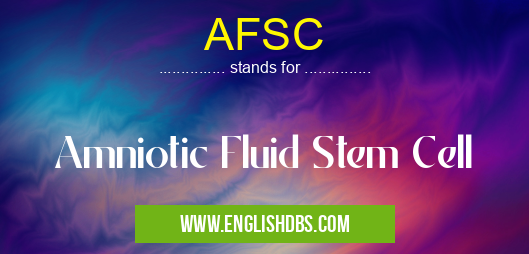What does AFSC mean in UNCLASSIFIED
AFSC stands for Amniotic Fluid Stem Cell. These are stem cells that are found in the amniotic fluid, which surrounds the developing fetus during pregnancy. AFSCs are pluripotent, meaning they have the potential to develop into any type of cell in the body. This makes them a promising source of cells for regenerative medicine and tissue engineering.

AFSC meaning in Unclassified in Miscellaneous
AFSC mostly used in an acronym Unclassified in Category Miscellaneous that means Amniotic Fluid Stem Cell
Shorthand: AFSC,
Full Form: Amniotic Fluid Stem Cell
For more information of "Amniotic Fluid Stem Cell", see the section below.
Types of AFSCs
There are two main types of AFSCs:
- Epithelial AFSCs: These are derived from the amniotic membrane, which lines the amniotic cavity.
- Mesenchymal AFSCs: These are derived from the amniotic fluid itself.
Characteristics of AFSCs
AFSCs have several unique characteristics that make them a valuable source of stem cells:
- Pluripotency: AFSCs can differentiate into a wide range of cell types, including cells of the heart, brain, liver, and lungs.
- Immunomodulatory properties: AFSCs have the ability to suppress the immune system, which makes them less likely to be rejected by the body.
- Low risk of tumor formation: AFSCs have a low risk of forming tumors, which is a concern with some other types of stem cells.
Applications of AFSCs
AFSCs have a wide range of potential applications in regenerative medicine and tissue engineering, including:
- Treatment of heart disease: AFSCs have been shown to improve heart function in animal models of heart failure.
- Treatment of neurological disorders: AFSCs have been shown to promote nerve regeneration and improve function in animal models of spinal cord injury and stroke.
- Treatment of liver disease: AFSCs have been shown to regenerate liver tissue and improve liver function in animal models of liver disease.
- Treatment of lung disease: AFSCs have been shown to improve lung function in animal models of lung injury.
Essential Questions and Answers on Amniotic Fluid Stem Cell in "MISCELLANEOUS»UNFILED"
What are Amniotic Fluid Stem Cells (AFSCs)?
AFSCs are multipotent stem cells found in the amniotic fluid that surrounds a developing fetus. They are derived from the inner cell mass of the blastocyst, the same source as embryonic stem cells. AFSCs have the potential to differentiate into a variety of cell types, including mesenchymal stem cells, neural stem cells, and epithelial cells.
What are the advantages of using AFSCs over other types of stem cells?
AFSCs have several advantages over other stem cell types:
- They are relatively easy to obtain and do not require invasive procedures.
- They have a low risk of causing immune rejection.
- They are less likely to form tumors than embryonic stem cells.
- They are non-controversial to use, as they do not involve the use of embryos.
What are the potential applications of AFSCs?
AFSCs have potential applications in a variety of therapeutic areas, including:
- Regenerative medicine: AFSCs can be used to repair damaged tissues and organs.
- Cell therapy: AFSCs can be used to treat a variety of diseases, such as Parkinson's disease, Alzheimer's disease, and spinal cord injuries.
- Tissue engineering: AFSCs can be used to create new tissues and organs for transplantation.
What is the current status of AFSC research?
AFSC research is still in its early stages, but there have been some promising results from clinical trials. For example, AFSCs have been shown to be safe and effective in treating graft-versus-host disease, a serious complication of bone marrow transplantation. Clinical trials are also underway to investigate the use of AFSCs to treat other diseases, such as heart disease, stroke, and arthritis.
What are the challenges to using AFSCs in clinical applications?
One of the main challenges to using AFSCs in clinical applications is the need to find ways to expand these cells in culture. AFSCs are relatively rare, and they need to be expanded in large numbers in order to be used for therapeutic purposes. Another challenge is the need to develop methods to control the differentiation of AFSCs into specific cell types.
What are the ethical considerations surrounding the use of AFSCs?
The use of AFSCs raises some ethical considerations, as these cells are derived from human embryos. However, it is important to note that AFSCs are not embryonic stem cells, and they do not have the same potential to form embryos. The use of AFSCs is generally considered to be ethical, as long as it is done with informed consent and in accordance with ethical guidelines.
Final Words: AFSCs are a promising source of stem cells for regenerative medicine and tissue engineering. Their pluripotency, immunomodulatory properties, and low risk of tumor formation make them an attractive option for a variety of clinical applications.
AFSC also stands for: |
|
| All stands for AFSC |
